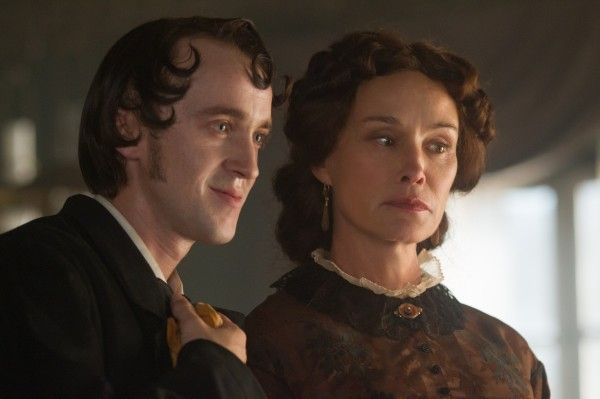Guilt is a disease. It’s not some fleeting emotion that can be easily squashed; sometimes it can fester and engulf one’s soul for a lifetime. The consequences of guilt and how it overwhelms every aspect of one’s life—effectively imprisoning them—are explored in great detail in Emile Zola’s novel and play Therese Raquin, and director Charlie Stratton’s new adaptation focuses on these same issues while also visually conveying the weighing guilt with a fair amount of skill. Unfortunately, the adaptation and its performances fail to provide any kind of emotional investment in the characters or story, resulting in a visually impressive but ultimately lifeless film. Hit the jump for my review of Therese.
As a young child, Therese Raquin is brought to live with her aunt (Jessica Lange) and sickly cousin as her father departs and tells her that he will return. The years go by and eventually an older Therese (Elizabeth Olsen) receives word that her father has now perished. Soon thereafter, Therese’s cousin Camille (Tom Felton) decides that he wants to move out of the countryside and into Paris where he can start a career, and Madame Raquin (Lange) suggests that Camille and Therese get married so the whole family can move together. The film then jumps to the trio’s life in Paris, as Madame Raquin and Therese tend to a little shop while Camille works a mind-numbing desk job in the city.
Therese is sexually repressed and feels no emotional love for her husband, so she lives her days in a state of haze, just kind of going through the motions. When Camille introduces Therese to his old friend Laurent (Oscar Isaac), the handsome lad soon starts making sexy eyes with Therese and the young wife begins to come to life. Therese and Laurent abruptly begin a sexual affair, and the normally reserved and quiet woman finally lets loose with gusto. Their lust is so strong that they decide to move Camille out of the picture so they can be together. The rest of the movie is a spiral down the deep despair that the two feel, as their guilt becomes a prison that prevents them from enjoying the life they so desperately desired.
Making his feature directorial debut, Stratton shows a strong visual hold on the story’s themes. The cinematography by Florian Hoffmeister starts off quaint and colorful and then slowly begins to fade into a sea of greys and blacks as Therese and Laurent becoming increasingly remorseful. Stratton’s handling of the story, however, is less effective, as the audience never feels invested in either of Therese’s relationships enough to care about the outcome.
The performances are fine, but Olsen doesn’t really show much range as Therese. The actress undeniably has talent, but her iteration of Therese is lacking in the emotional pull necessary to create a connection with the audience. We get it, she likes sex, but there’s nary a hint of emotional attachment to be seen with either Laurent or Camille. It’s hard to see where Therese is coming from when she appears remorseful about Camille’s death, since she was clearly bored senseless—and sometimes just downright disdainful—whenever he was around. Isaac does what he can with Laurent, but again the script provides little to latch onto so the character is just kind of there. Even though he does deplorable things, this iteration of Laurent feels of lifeless, and it’s really only Lange’s work as Madame Raquin that evokes the slightest bit of an emotional response.
By the end of Therese, the audience is just kind of following along without any investment in what happens to the characters. Visually Stratton proves to be very adept at telling this story, but he’s unable bring the same skill to his characters and script. It’s an admirable effort and it’s very clear that Therese and Laurent are holed up in an emotional prison for most of the film, but we simply don’t care whether they get out or rot.
Rating: C-
Click here to catch up on all of our Toronto International Film Festival coverage thus far.



